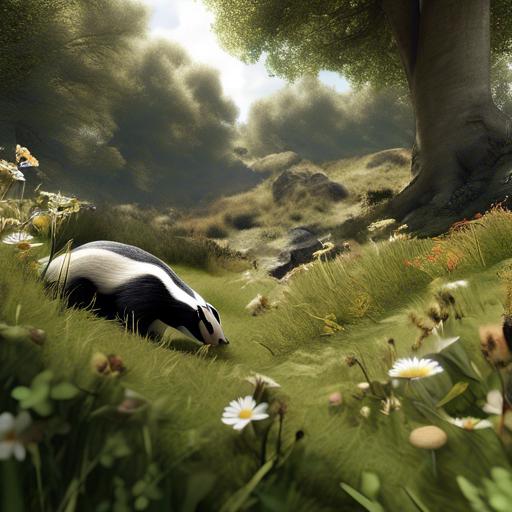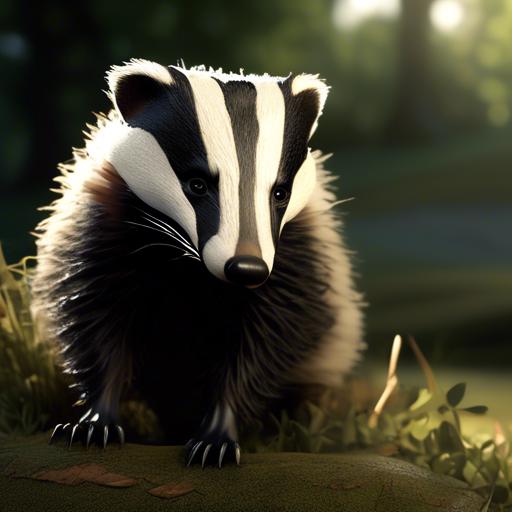As I trudge through the dense undergrowth of the forest, my eyes darting from tree to tree, I can’t help but wonder: where does the elusive badger make its home? These creatures have long fascinated me with their secretive nature and uncanny ability to evade detection. Join me on a journey to uncover the mysterious dwellings of the badger and learn more about their interesting habits and habitats.
Exploring the Habitats of Badgers: From Woodlands to Meadows
Badgers are fascinating creatures that can be found in a variety of habitats, showcasing their adaptability and resourcefulness. From dense woodlands to sprawling meadows,these elusive animals make their homes in diverse environments. In woodlands, badgers thrive in the shelter of thick vegetation, using their strong claws to dig intricate underground burrows for nesting and protection.these wooded areas provide ample hiding spots and access to a variety of food sources, such as insects, small mammals, and plant roots.
In contrast, meadows offer badgers open spaces to roam and hunt for food. Their keen sense of smell and sharp claws aid them in foraging for worms, grubs, and other small creatures in the grassy expanse. Meadows also provide plenty of sunlight for basking and socializing, as badgers are known for their tight-knit family groups. Whether nestled in the serene tranquility of woodlands or basking in the vast openness of meadows, badgers showcase their remarkable ability to thrive in a range of habitats.
The Secret Life of Badgers: Unveiling Their Underground Dwellings
Have you ever wondered where badgers live? These elusive creatures have a secret life underground, where they create intricate dwellings called setts. These setts serve as their homes, providing shelter and safety for them and their young.
Badgers are skilled diggers, using their powerful claws to excavate tunnels and chambers within the sett. These underground networks can be quite complex, with multiple entrances and interconnected tunnels. Within the sett, badgers will have separate sleeping chambers, a latrine area, and even a food storage space. It’s truly fascinating to uncover the hidden world of badgers and their underground dwellings.
Conservation Efforts: Protecting Badger Homes and Habitats
Badgers are elusive creatures that make their homes in underground burrows known as setts. These setts can be found in a variety of habitats, including woodlands, meadows, and even urban areas. Badgers are known to be great diggers, creating intricate tunnel systems that can extend for meters underground. These burrows provide a safe haven for badgers to rest, raise their young, and hibernate during the winter months.
Conservation efforts are crucial in protecting badger homes and habitats. By preserving and maintaining the natural environments where badgers live,we can ensure that these animals have a safe place to thrive.This includes implementing measures to prevent habitat destruction,such as deforestation and urbanization,and also promoting responsible land management practices. By working together to protect badger habitats, we can help ensure the survival of these iconic creatures for generations to come.
Q&A
Q: Where does the badger live?
A: Badgers can be found throughout much of North America, Europe, and Asia, with different species occupying different habitats within these regions.
Q: What type of habitat do badgers prefer?
A: Badgers typically prefer habitats with open areas for foraging, such as grasslands, meadows, and farmland. They also often make their homes in wooded areas or near water sources.
Q: Are badgers social animals?
A: Badgers are generally solitary animals, although they may form small family groups or share dens during the winter months.
Q: Do badgers hibernate?
A: Yes, badgers are known to hibernate during the winter months, often sharing dens with other badgers for warmth.
Q: Can badgers be found in urban areas?
A: While badgers are primarily found in rural and wooded areas,they have been known to venture into urban areas in search of food and shelter.Q: Are badgers a protected species?
A: Yes,badgers are protected in many countries due to threats such as habitat loss and persecution. in the UK, for example, badgers are protected under the Badgers Act of 1992.
In Summary
As we conclude our exploration of where the badger lives, we are left with a newfound recognition for these elusive creatures and the unique habitats they call home. From woodlands to meadows, burrows to setts, the badger’s ability to adapt and thrive in diverse environments is truly remarkable.Next time you find yourself wandering in the great outdoors, keep an eye out for signs of badger activity – you never know what treasures you may uncover. Until next time,happy badger spotting!


